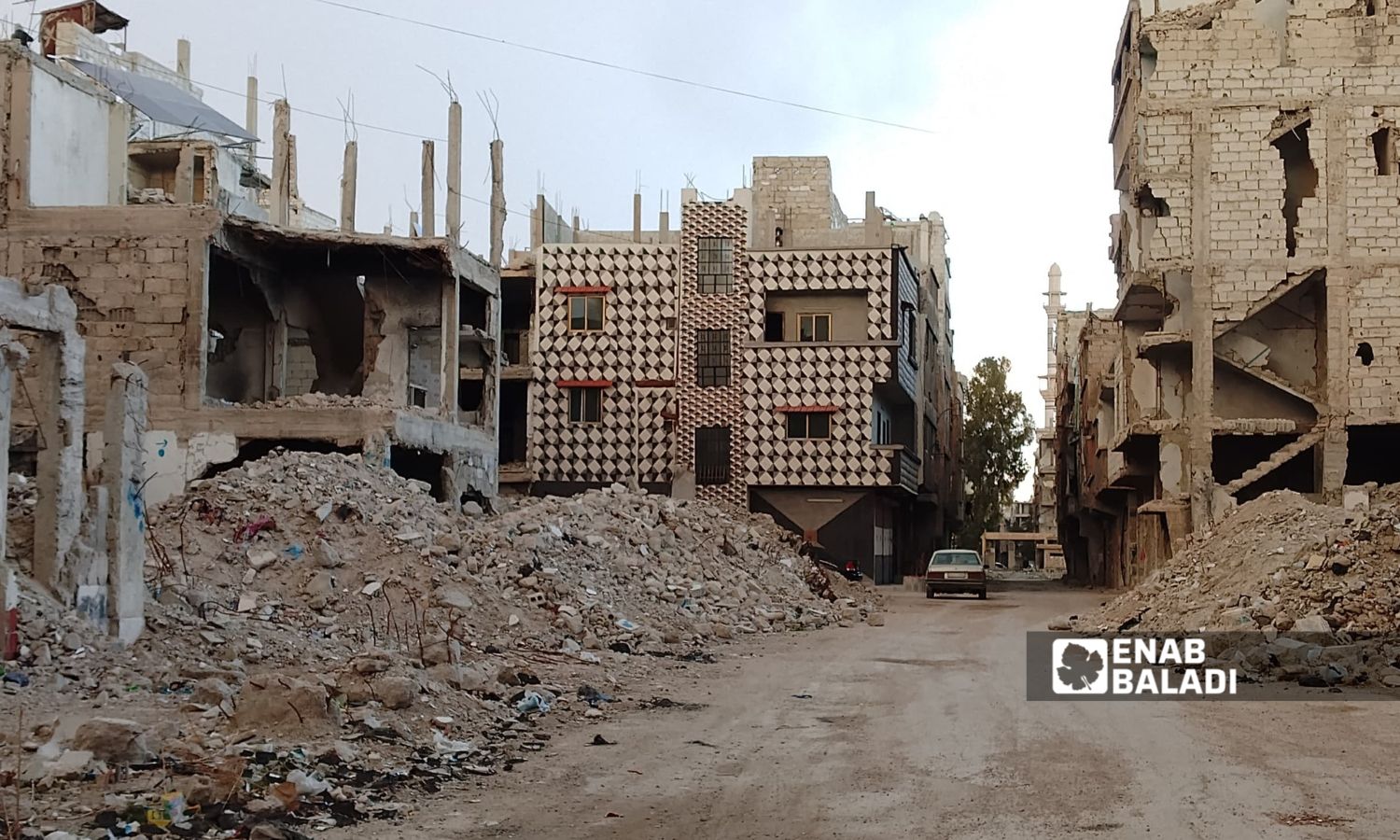Enab Baladi – Besan Khalaf
Zaid Mofleh’s joy was short-lived when he returned to his home in the Sayyida Zainab neighborhood south of Damascus, only to find another family living in his house.
Mofleh, who was subjected to arbitrary detention by the previous regime, along with the war and displacement that forced him to seek refuge in the Netherlands, returned home after the regime’s fall to find his house taken over by another family. This family had purchased his house from a real estate agency in the area for 25 million Syrian pounds in 2020, equivalent to ten thousand dollars at that time.
Mofleh told Enab Baladi that he initially bought the land in 1980 from a local farmer, through a court ruling and not via a green title deed. With his flight from Damascus to the Netherlands, ownership of his home in the neighborhood was lost, as it also faced bombing.
“To have someone else living in your home without your consent means your memories have been stolen,” said Mofleh, who has brought his case to the Syrian courts and is now waiting for the court’s decision.
“This rubble is my home”
Mofleh’s story is similar to that of Hussein Zaatar, who found no evidence to prove that the pile of rubble in the al-Hajar al-Aswad area was once his home.
With heartbreak, Zaatar wondered, “How can I prove that this rubble was once my house? I fled without any documents verifying who I am.” He told Enab Baladi, “I wish I hadn’t spent my life building a house that no longer belongs to me.”
Zaatar left his home in 2013 after the al-Hajar al-Aswad area was bombarded and besieged by the Assad regime.
Zaatar has filed a lawsuit to establish ownership of the land on which his house was built.
Legal solutions
Lawyer Jihad Ibrahim explained to Enab Baladi that in cases of disputes over property ownership that has been seized or sold unlawfully, and in the absence of official documents proving the original owner’s ownership, the owner can resort to the Syrian judiciary and file a lawsuit for establishing ownership.
In these lawsuits, non-official means of evidence can be relied upon, including:
Testimonies from neighbors or witnesses who know that the property belongs to the plaintiff. Water or electricity bills or services registered in the name of the plaintiff. Photos or unofficial documents proving possession or management of the property. Old rental contracts or official correspondence.The court may consider this evidence collectively to issue a ruling that establishes ownership, bearing in mind that the burden of proof is higher in the absence of formal documents like the green title deed, according to Ibrahim.
In the event of losing the court ruling that establishes ownership, the owner can submit a request to the court to obtain a duplicate of the lost ruling by:
Submitting a request to the office of the court that issued the ruling. Proving a legal interest in obtaining a copy of it (as the holder of the ruling). Attaching supporting identification documents (such as the foundation number, date of the ruling, or the judge’s name).If obtaining a copy of the ruling is not possible, a new ownership verification lawsuit can be opened based on the same facts, provided that they have not been rendered invalid or altered by new legal or regulatory developments, according to Ibrahim.
Green title deed and court ruling
Houses in Syria are sold through two documents: the green title deed and the court ruling.
The green title deed is the official ownership document issued by the real estate registry, and it is considered the strongest evidence of property ownership in Syrian law; it can only be contested through a forgery lawsuit or registration cancellation in exceptional cases.
The court ruling is a judicial decision that proves ownership based on the evidence and clues presented by the plaintiff. This ruling can be used to establish ownership in the real estate registry if there is no prior green title deed, but it is not considered a definitive property document unless it is registered correctly.
Lawyer Jihad Ibrahim clarified that the green title deed is stronger in legal terms, but the court ruling can be the means to obtain the green title deed in its absence.
Syrians search for ways to prove ownership of their homes Enab Baladi.
Read More Details
Finally We wish PressBee provided you with enough information of ( Syrians search for ways to prove ownership of their homes )
Also on site :
- Man accused of pointing gun at troopers during I-90 standoff set to be arraigned
- European militarization robbing taxpayers – Lavrov
- Sleek New Costco Air Fryer Is PFAS-Free, Portable, and Built for Speed

